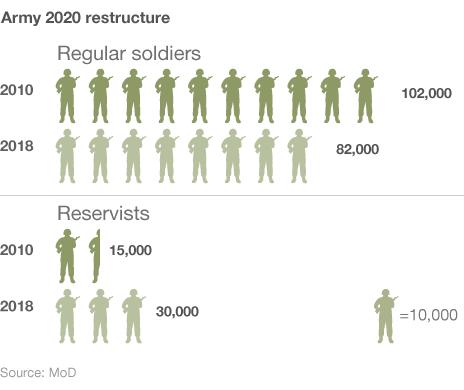Army reservists overhaul outlined by Philip Hammond
- Published
Defence Secretary Philip Hammond: "We are investing an additional £1.8 bn in the reserves over the next 10 years"
Army reservists will have an "integral" role in the military if they commit to regular training and deployment, the defence secretary has vowed.
Philip Hammond said reservists would receive more training and investment.
The government wants to double the size of the Territorial Army from 15,000 to 30,000 while the regular Army's strength is cut by 20,000 to 82,000.
Labour accused the government of lacking a coherent strategy in the wake of army cuts.
Under the proposed changes outlined by Mr Hammond in a central London speech, the Territorial Army would in future be known as the Army Reserves, to reflect its greater role.
'Exciting proposition'
The plans, which also covers navy and RAF reservists, are being put out for consultation. The government says responses will form part of a White Paper to be published next year on the future role of reservists.
Mr Hammond said if future reservists made the commitment to regular training and deployment, they would be made an "integral part" of the Army and "a fundamental part of how we provide military capacity".
They would, he said, be "part of a whole force... designed to ensure the nation's security".
He said the changes were an "exciting proposition", telling would-be reservists: "Promise us you will make the commitment. Turn up regularly to train and be prepared to deploy. We promise to use you as an integral part of the British Army."
He also said there would be "greater opportunities for promotion" in the new arrangement.
The government says it will work with employers of reservists and give them more notice before staff are deployed.
Under current arrangements, TA soldiers who have full-time or part-time jobs attend training sessions in their own free time. They are paid about £35 a day for each session.
They have to commit to between 19 and 27 training days a year and, if they meet this commitment, get a tax-free lump sum called a bounty, which ranges from £424 to £2,098.
Travel to and from their units is also subsidised and they do not have to pay towards their kit.
Under Mr Hammond's plans, reservists' training would increase to 40 days a year - with the promise that if they met their commitments they would be better equipped and funded.
The Ministry of Defence said it would spend £1.8 billion over the next decade to make that possible.
"This investment will support an increase in our reserve forces to a trained strength in the Army Reserve of 30,000, the Maritime Reserve of 3,100 and the Royal Auxiliary Air Force of 1,800, all by 2018," said Mr Hammond.
Regular soldiers who leave the service will also be encouraged to join the reserves.
Speaking ahead of the announcement, Mr Hammond had said the plans would bring the UK's armed forces closer in line with its major allies, all of whom have a bigger reserve element in their forces.
Companies that support reservists on their staff could be awarded a badge similar to the kite mark in recognition of their efforts.
Employers' organisation the CBI has said that while it is ready to help the government, it is disappointed by the lack of proper engagement on the issue so far.
Shadow defence secretary Jim Murphy accused the government of lacking a coherent strategy, arguing that there was "a plan for cutting the Army but not for boosting the reservists".
"I would like to see a bit more cohesion and a bit more logic," he said.
'Revitalisation' urged
Mr Murphy said he was in favour of the enhancement of the role of the reserves, but stressed that ministers must provide more support if more was going to be asked of reservists.
"At a difficult time for many companies, employers must be given the support they need when their workers serve on reserve duty," he said.
Last year an independent commission, set up in the wake of the Strategic Defence and Security Review, concluded that the UK's reserve forces were in need of "significant revitalisation".
Britain has had a reserve of part-time or retired soldiers - often known as yeomanry - since the Middle Ages but the system was only regularised in 1907 with the passing of legislation creating a Territorial Force.
In 1920 it became the Territorial Army, with members fighting in WWI and WWII.
Some 6,900 TA soldiers were mobilised for the invasion of Iraq in 2003.

- Published3 July 2013
- Published14 October 2012
- Published19 September 2012